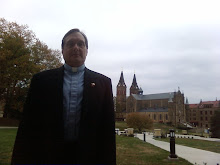Jer 1:4-5, 17-19
1 Cor 12:31—13:13
Lk 4:21-30
Walking is supposed to be a good way of maintaining you health. A good brisk walk can help keep your heart in shape, help maintain your weight, and just generally make you feel better. The good people of Jesus’ native town, shortly after services in the synagogue, invited Jesus to take a short walk, though I doubt it would have done much for his health. It was, indeed a very short walk, just one step, albeit one very long step. They were just a bit upset with him, when he pointed out that a prophet is generally not well received in that prophet’s native place. He pointed out how miracles had been worked, but for outsiders like Naaman. They were upset, ostensibly because Jesus failed to do mighty works for them as he had done for others. Deep inside though, I think they understood that he was right. They didn’t turn to Jesus in faith, they wanted parlor tricks. It wasn’t faith that drove them, but superstition. Do this and I’ll believe. Prove to me you are who you seem to be. After all, we know you, we know your family, why should we accept you? Make this easy for us, tell us what to do and say and think after you work a couple of miracles so we’ll know you are legitimate. Without special signs they could not, would not, believe. That is not faith, that is superstition. I am not denigrating the idea of miracles, miracles have happened, miracles continue to happen, everyday. Miracles don’t happen just to bring about faith, they happen because of faith. How many times did Jesus tell someone that faith had saved them, that faith had cured them? The miracle came about because that person believed. A miracle may lead others to faith, but it only leads there, it is not a substitute for faith. Faith is a gift that God gives each of us, a gift that requires no proof.
Deacon John
Fourth Sunday in Ordinary Time
Jan. 31, 2010
Sunday, January 31, 2010
Sunday, January 17, 2010
Second Sunday in Ordinary Time
Is 62:1-5
1 Cor 12:4-11
Jn 2:1-11
There was a wedding feast in a place called Cana, and the wine was running low, real low. Mary turns to her son, tells him of this predicament, and he, after initially balking, does as his mother asks. Even in the face of his refusal, Mary turns to the servers and tells them, “Do whatever he tells you.” Mary gives what may be the best advice in all the Scripture, “Do whatever he tells you.” Jesus instructs the servers to fill the jugs meant to hold water for ceremonial washing to the brim with water. They do, and then again follow Jesus’ instructions and draw out the water now made wine, take it to the chief steward, who proclaims it the best wine yet. Those servers did what was asked of them without knowing the outcome of their actions, without knowing if what they were doing would matter, make any difference. They simply followed Mary’s advice and did whatever Jesus told them. Mary started this whole chain of events by asking Jesus for help, and then telling the servers to follow him. The servers had no idea what would happen, but trusted that following Jesus would lead to good. That advice that Mary gave then is good for us as well. “Do whatever he tells you.” What the Christ tells us is to love, to care about the other, to live unselfishly, to give. We may not always know the outcome of following that advice. We may give of ourselves and not see the results, but that doesn’t mean what we do has no effect. We may never see the results of the good we attempt to do, but we must do it anyway. When we love, when we live as Christ asks, we touch people, we make a difference though that difference may never be known to us. The servers followed Mary’s advice and did as Jesus asked even though they did not know what would happen. We may never see the results of what we do, but we should listen and follow Mary’s advice as well, and do whatever he asks.
Deacon John
Second Sunday in Ordinary Time
Jan 17, 2010
1 Cor 12:4-11
Jn 2:1-11
There was a wedding feast in a place called Cana, and the wine was running low, real low. Mary turns to her son, tells him of this predicament, and he, after initially balking, does as his mother asks. Even in the face of his refusal, Mary turns to the servers and tells them, “Do whatever he tells you.” Mary gives what may be the best advice in all the Scripture, “Do whatever he tells you.” Jesus instructs the servers to fill the jugs meant to hold water for ceremonial washing to the brim with water. They do, and then again follow Jesus’ instructions and draw out the water now made wine, take it to the chief steward, who proclaims it the best wine yet. Those servers did what was asked of them without knowing the outcome of their actions, without knowing if what they were doing would matter, make any difference. They simply followed Mary’s advice and did whatever Jesus told them. Mary started this whole chain of events by asking Jesus for help, and then telling the servers to follow him. The servers had no idea what would happen, but trusted that following Jesus would lead to good. That advice that Mary gave then is good for us as well. “Do whatever he tells you.” What the Christ tells us is to love, to care about the other, to live unselfishly, to give. We may not always know the outcome of following that advice. We may give of ourselves and not see the results, but that doesn’t mean what we do has no effect. We may never see the results of the good we attempt to do, but we must do it anyway. When we love, when we live as Christ asks, we touch people, we make a difference though that difference may never be known to us. The servers followed Mary’s advice and did as Jesus asked even though they did not know what would happen. We may never see the results of what we do, but we should listen and follow Mary’s advice as well, and do whatever he asks.
Deacon John
Second Sunday in Ordinary Time
Jan 17, 2010
Sunday, January 03, 2010
The Epiphany of the Lord
Is 60:1-6
Eph 3:2-3a, 5-6
Mt 2:1-12
Today’s Gospel starts with this statement, When Jesus was born in Bethlehem of Judea, in the days of King Herod, behold, magi from the east arrived in Jerusalem, saying, “Where is the newborn king of the Jews?
We saw his star at its rising and have come to do him homage.” Which leads to the question, why? Why did Magi, Wiseman, kings, come from a distant land to the east to pay homage to the newborn king of the Jews? Why would they care? Were they just being polite?
This time of year we see the return of light, physical light, to the world. In our hemisphere days are getting longer, the sun rises a bit earlier and sets a bit later. When the sun shines it does not shine only on a particular place, or a particular people, the sun shines for everyone. At Christmas we celebrated the rising of the Son, the dawn of a new light, a light not meant only for a few, but for all. The Magi came to pay homage to the Christ, not because he was the newborn king of the Jews, but because he is the newborn king of all. They were drawn by the light, the light of the Son, a light that, just as the physical sun does, shines on everyone. They came to make known to the world that this newborn king is king of all, they came to open the eyes of all people to the light of the Son, the light that clears away the darkness and guides us home.
Deacon John
The Epiphany of the Lord
Jan. 3, 2010
Eph 3:2-3a, 5-6
Mt 2:1-12
Today’s Gospel starts with this statement, When Jesus was born in Bethlehem of Judea, in the days of King Herod, behold, magi from the east arrived in Jerusalem, saying, “Where is the newborn king of the Jews?
We saw his star at its rising and have come to do him homage.” Which leads to the question, why? Why did Magi, Wiseman, kings, come from a distant land to the east to pay homage to the newborn king of the Jews? Why would they care? Were they just being polite?
This time of year we see the return of light, physical light, to the world. In our hemisphere days are getting longer, the sun rises a bit earlier and sets a bit later. When the sun shines it does not shine only on a particular place, or a particular people, the sun shines for everyone. At Christmas we celebrated the rising of the Son, the dawn of a new light, a light not meant only for a few, but for all. The Magi came to pay homage to the Christ, not because he was the newborn king of the Jews, but because he is the newborn king of all. They were drawn by the light, the light of the Son, a light that, just as the physical sun does, shines on everyone. They came to make known to the world that this newborn king is king of all, they came to open the eyes of all people to the light of the Son, the light that clears away the darkness and guides us home.
Deacon John
The Epiphany of the Lord
Jan. 3, 2010
Subscribe to:
Comments (Atom)








